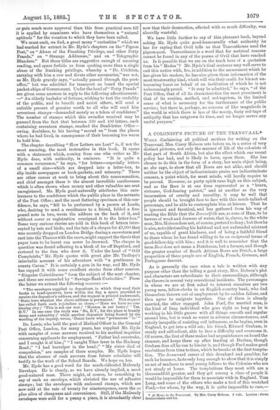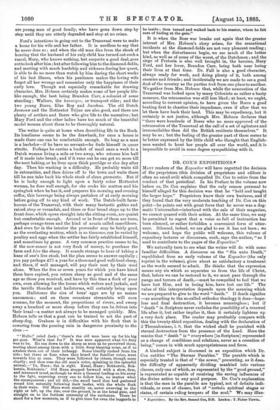A COLONIST'S PICTURE OF THE TRANSVAAL.*
WHILE disclaiming all political motives for writing on the Transvaal, Mrs. Carey Hobson sets before us, in a series of very distinct pictures, not only the manner of life of the colonists of that part of South Africa, but also the effect which our recent policy has had, and is likely to have, upon them. She has chosen to do this in the form of a story, her main object being, as she says, to show that all Boers are not alike, and should neither be the object of indiscriminate praise nor indiscriminate censure, a point which, for most minds, will hardly require to be proved. However, as party spirit runs high on this subject, and as the Boer is at one time represented as a "brave, virtuous, God-fearing patriot," and at another as the very incarnation of cruelty and rascality, it may be well that people should be brought face to face with this much-talked-of personage, and be able to contemplate him at leisure. That he is ignorant and fanatical, and has gathered from his way of reading the Bible that the Zwaartfolk are, as sons of Ham, to be hewers of wood and drawers of water, that is, slaves, to the white man, Mrs. Hobson does not, of course, pretend to deny; but then he is also, notwithstanding his habitual and not unfounded mistrust of us, capable of great kindness, and of being a faithful friend to those whom he has found willing to be on reciprocal terms of good-fellowship with him ; and it is well to remember that the term Boer does not mean a Dutchman, but a farmer, and though the greater number of South African Boers are Dutch, a large proportion of these people are of English, French, German, and Portuguese descent.
As is generally the case when a tale is written with any purpose other than the telling a good story, Mrs. Hobson's plot and characters are subordinate to their surroundings, although she throws in several very sensational incidents. The personages in whom we are at first asked to interest ourselves are two young men, fellow-clerks in an English country bank, who find themselves thrown out of employment by its sudden failure, and then agree to emigrate together. One of them is already married, the other engaged. John Ford, the married man, is the kind of limp individual who goes right so long as he is working in his little groove with all things smooth and regular around him, but is weak as water in adverse circumstances, and utterly incapable of resisting evil influences, so he begins, even in England, to get into a wild set; his friend, Edward Graham, is steady and self-reliant, able to face a difficulty and overcome it. Of course, the first of these makes bad acquaintances on board the steamer, and keeps them up after landing at Durban, though Graham does all he can to hinder it, and though Ford makes good resolutions from time to time, which he breaks at the first tempta- tion. The downward career of this drunkard and gambler, for such he becomes, lasts only long enough to show that it is simply an act of madness to send young fellows to the Colonies who are not steady at home. The temptations they meet with are a thousandfold greater, and they get among a class of people it would be impossible for them to associate with in England. Tom Long, and some of the others who make a tool of this wretched Ford,—for whom, by the way, it is quite impossible to care,—
• At Home in the Transvaal. By Mrs. Carey Hobson. 2 vols. London : Swan Sonnenschein and Co.
are young men of good family, who have gone down step by step until they are utterly degraded and stop at no crime.
Ford's intentions in going out to the Transvaal were to make a home for his wife and her father. It is needless to say that he never does so ; and when the old man dies from the shock of hearing that the husband of his only child has turned out such a rascal, Mary, who knows nothing, but suspects a good deal, goes out to look after him; but after following him to the diamond-fields, and meeting with much hardship and sickness during her quest, is able to do no more than watch by him during the short weeks of his last illness, when his penitence makes the loving wife forget all her wrongs and remember only the happiness of their early love. Though not especially remarkable for drawing character, Mrs. Hobson certainly makes some of her people life- like enough, the best being Brandon Carr, a colonist of some
standing ; Walters, the kartveyer, or transport rider; and the two young Boers, Kies Roy and Jacobus. The old Dutch Jevrouw and the Hottentot Trijne are also good, and there are
plenty of settlers and Boers who give life to the narrative; but Mary Ford and the other ladies have too much of the beautiful model woman about them to be thoroughly natural.
The writer is quite at home when describing life in the Bush. Its loneliness seems to be the drawback, for once a house is made there one can be comfortable enough. So long as a man is a bachelor—if he have no servant—he finds himself in queer straits. Perhaps he carries a bucket of meal once a week to a Dutch woman living a mile or two away, who returns him half of it made into bread; and if it runs out he can get no more till the next baking, or he lives upon thick porridge or rice day after day. Then his washing is a difficulty. He probably waits till in extremities, and then drives off to the town and waits there till he can take back his whole stock of clean garments. But if he is lucky enough to light upon a fairly sober Hottentot woman, he does well enough, for she cooks his mutton and his springbok when he has it, and prepares his morning and evening coffee, this beverage being always partaken of at early morning
before going off to any kind of work. The Dutch-built farm- houses of the Transvaal, with their many fantastic gables and raised stoep or verandah, and three or four broad steps up to the front door, which opens straight into the sitting-room, are quaint
but comfortable enough. Around or in front of them are trees, perhaps orange-trees and the kind of acacia called camelthorn.
And even far in the interior the provender may be fairly good, as the everlasting mutton, which is so tiresome, can be varied by poultry and eggs when the settler has fairly established himself, and sometimes by game. A very common practice seems to be,
if the new-comer is not very flash of money, to purchase the farm and hire the sheep. It sounds strange to hear of taking a lease of one's live stock, but the plan seems to answer capitally ;
you pay perhaps £75 a year for a thousand good well-bred sheep, and these, if well managed, will pay their rent by their wool alone. When the five or seven years for which you have hired them have expired, you return sheep as good and of the same age as those you received, and have by this time a flock of your own, even allowing for the losses which wolves and jackals, and the terrific thunder and hailstorms, will certainly bring upon you. Hailstones the size of hens' eggs are by no means uncommon; and on these occasions streamlets will soon assume, for the moment, the proportions of rivers, and sweep away a hundred or more sheep before they can be driven into their kraal—a matter not always to be managed quickly. Mrs. Hobson tells us that a goat can be trained to act the part of sheep-dog. Graham is in difficulties with his flock that is cowering from the pouring rain in dangerous proximity to the river :-
" 'Hullo!' cried Jack ; ` there's the old man been up for his big pet goat. What's that for ?' It was soon apparent what his duty was to be. He ran down to the sheep as soon as be perceived them, moving about among them with a little deep bleating noise, as if to awaken them out of their lethargy. Some timidly rushed from his side ; but three or four, when they heard the familiar voice, went towards him at once. They were followed by others, though more charily ; and then rose the old man's voice, speaking to the splendid animal,—` Ya, Hans ; dat is right. Kraal, Hans ; Bokkerein, Bok- kerein, Bokkerein.' Old Hans stepped forward with a slow, firm, and measured tread, as though he were a General leading on his army to the fight, expecting every one to follow him, no matter what the consequences ; and all did,—the small band that had gathered round him naturally following their leader, with the whole flock in their wake. Old Hans went steadily on, never swerving to the right or left, up the rise, over the ground, in at the kraal gate, and straight on to the farthest extremity of the enclosure. There he stood for a few moments, as if to give time for even the laggards to
be inside • then turned and walked back to his master, whom he felt sure of finding at the gate."
It is when the Boer war breaks out again that the greater interest of Mrs. Hobson's story arises, for the sensational incidents at the diamond-fields are not very pleasant reading ; but when the disturbances begin, we see much of the better kind, as well as of some of the worst, of the Dutchmen ; and the siege of Pretoria is also well brought in, the heroine, Mary Ford, and her lover, Brandon Carr, being both near losing their lives at that time. Dr. Fall is also a good character, always ready for work, and doing plenty of it, both among enemies and friends ; and incidentally we are made to see a good deal of the country as the parties trek from one place to another. We gather from Mrs. Hobson that, while the annexation of the Transvaal was looked upon by many Colonists as rather a hasty measure, the retrocession was still less liked ; at least, we ought, according to current opinion, to have given the Boers a good beating first to chastise their impudence, even if after that we let them have back their land. This may be expediency, but it certainly is not justice, although Mrs. Hobson declares that " there were hundreds of Boers who no more approved of the retrocession of the Transvaal at the call of a set of agitators and irreconcilables than did the British residents themselves." It may be so ; but the feeling of the greater part of them seems to be better expressed by the little child who thought that English- men wanted to hunt her people all over the world, and it is impossible to avoid in some degree sympathising with it.



































 Previous page
Previous page